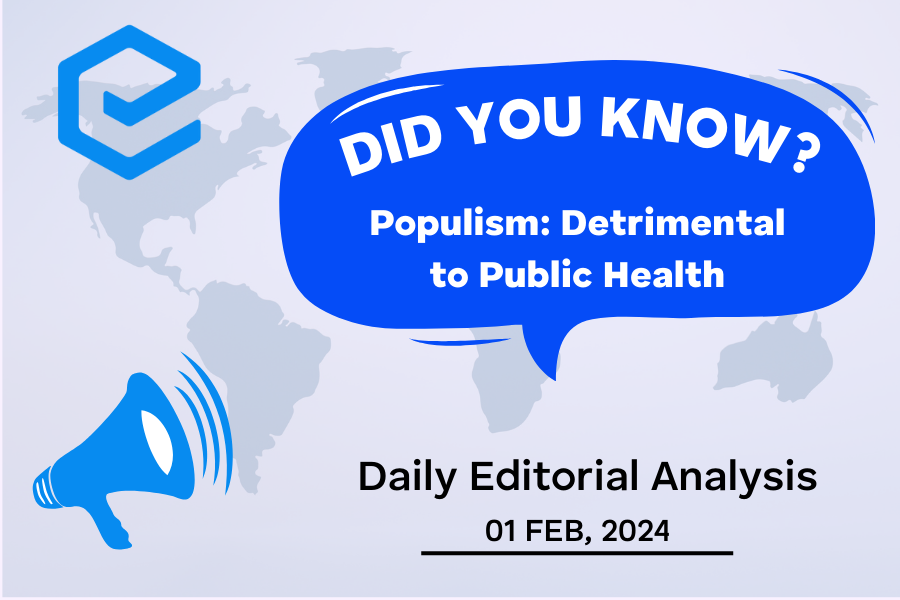
Populism, with its characteristic appeal to the sentiments and preferences of the general population, has shown a concerning trend of being detrimental to public health. In the context of healthcare decision-making, populist leaders often prioritize short-term political gains over evidence-based policies, potentially undermining the effectiveness of public health initiatives. This approach can manifest in the downplaying of scientific expertise, fostering misinformation, and impeding the swift implementation of necessary health measures. The consequences of such actions were notably evident during the COVID-19 pandemic, where populist leaders in various countries downplayed the severity of the virus, delayed crucial interventions, and eroded public trust in science and public health institutions. As we navigate the complex landscape of global health challenges, it is crucial to critically examine the impact of populism on public health and advocate for policies grounded in evidence and expertise rather than populist appeal.
Tag: GS-2 Health
Contents
- 1 In News:
- 2 The Dichotomy in Democratic Public Health Processes in India
- 3 Frequently Asked Questions (FAQs)
- 3.1 Q1: How does populism influence public health policies?
- 3.2 Q2: What role does misinformation play in the context of populism and public health?
- 3.3 Q3: How did populism impact the response to the COVID-19 pandemic?
- 3.4 Q4: Can populism contribute to disparities in healthcare access and outcomes?
- 3.5 Q5: How can societies mitigate the negative impact of populism on public health?
- 4 In case you still have your doubts, contact us on 9811333901.
In News:
In the varied landscape of India, where bustling cities coexist with serene villages, a subtle struggle for public health is underway. However, this endeavour often takes a backseat in public attention compared to the allure of disease cure.
The Dichotomy in Democratic Public Health Processes in India
- Focus on New Hospitals and Subsidized Treatments
- The emphasis on constructing new hospitals and providing subsidized treatments is a characteristic of democratic governance.
- While addressing immediate healthcare needs, the effectiveness in promoting sustained population health is questioned.
- Emergency response strategies are favoured, often lacking action beyond public announcements.
- Placement of Emergency Response Over Prevention
- Visible achievements are constrained by budgetary limitations, impacting effective implementation.
- Neglect of critical areas like sanitation, disease surveillance, and public health education.
- Unsung victories in disease eradication are overshadowed by tangible achievements.
- A Case Study of Dengue Highlighting Dichotomy
- Short-term focused response during outbreaks.
- Neglect of root causes and prevention strategies.
- Need for research and development in areas like vaccine development and understanding vector bionomics.
- Challenges and Disparities in Public Health
- Profit-driven nature of the pharmaceutical industry affecting public health.
- Socio-economic factors contributing to health disparities.
- Policy targets vs. health realities and gaps in public health efforts.
- Absence of Specialized Courses
- Lack of specialized courses in India’s education system for a multidisciplinary approach.
- Public health should involve expertise from various fields.
- Way Forward
- More focus on preventive management in public health.
- Need for autonomy in healthcare, separating policymaking from political influence.
- Assessing India’s university ranking goals and proposed interventions for improvement.
- Strategic Partnerships with Defence Initiatives
- Collaborating with defence initiatives to enhance project management efficiency.
- Strategic partnerships with universities can contribute to national security.
- Conclusion
- Urgent need to reimagine public health governance with evidence-based, holistic, and long-term strategies addressing immediate and future health needs.
Source: TH
Frequently Asked Questions (FAQs)
Q1: How does populism influence public health policies?
Populism can influence public health policies by prioritizing immediate political gains over evidence-based decision-making. Populist leaders may downplay the importance of scientific expertise, leading to the implementation of policies that are not grounded in sound public health principles.
Q2: What role does misinformation play in the context of populism and public health?
Populist leaders may contribute to the spread of misinformation by selectively highlighting or dismissing scientific findings to align with their political narratives. This can create confusion among the public, erode trust in health institutions, and hinder effective communication during health crises.
Q3: How did populism impact the response to the COVID-19 pandemic?
During the COVID-19 pandemic, some populist leaders downplayed the severity of the virus, delayed implementing necessary public health measures, and fostered a climate of skepticism towards preventive measures. This hindered a coordinated and science-driven response, leading to increased transmission and negative health outcomes.
Q4: Can populism contribute to disparities in healthcare access and outcomes?
Populist policies may disproportionately affect vulnerable populations, as leaders may focus on policies that resonate with their political base rather than addressing systemic health inequalities. This can result in disparities in healthcare access, exacerbating existing public health challenges.
Q5: How can societies mitigate the negative impact of populism on public health?
Mitigating the negative impact of populism on public health requires promoting transparency, strengthening scientific literacy, and advocating for evidence-based policies. Building public trust in health institutions, fostering open communication, and holding leaders accountable for their decisions are essential steps in safeguarding public health in the face of populist influences.
In case you still have your doubts, contact us on 9811333901.
For UPSC Prelims Resources, Click here
For Daily Updates and Study Material:
Join our Telegram Channel – Edukemy for IAS
- 1. Learn through Videos – here
- 2. Be Exam Ready by Practicing Daily MCQs – here
- 3. Daily Newsletter – Get all your Current Affairs Covered – here
- 4. Mains Answer Writing Practice – here

